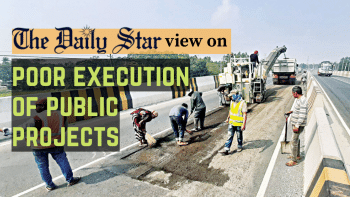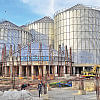Speed up the food storage project

It is no secret that delays and rising costs of development projects have become commonplace in the country. According to a recent report by this daily, a government project undertaken in 2014, named "Modern Food Storage Facilities Project," which aimed to build eight silos across districts and also serve 500,000 rural households in 63 upazilas during times of scarcity, has made less than 50 percent progress. Ten years after the project was initiated, none of the silos have been built, while the project cost has been revised upwards by 86 percent, in sheer wastage of taxpayers' money. The situation is completely unacceptable.
It must also be noted that the project aimed to digitalise monitoring of the country's overall food stock, including transportation and market supervision, to reduce inefficiencies – a much-needed action plan. But that, too, has not been accomplished. According to the Implementation Monitoring and Evaluation Division (IMED), the reason lies in negligence of the companies contracted to make the software for the digitalisation system, namely Beximco Computers Ltd, Tech Mahindra Ltd of India, and Tech Valley Networks Ltd of Bangladesh. It is beyond our understanding as to how firms contracted public projects can get away with missed deadlines. The authorities must hold these firms accountable and put in place penalties for further impediment due to negligence. The firms must pull through and fulfil the obligations of their contract.
Excuses citing delays in licensing or the dollar crisis cannot justify the financial burden of incompetence any longer. The IMED report on the project discovered loopholes in the feasibility study and mistakes in the design. Steps must be taken to address these anomalies. The stagnant project, which was scheduled for completion by June 2020, is being proposed by the Planning Commission to be completed by 2025, subject to the World Bank's approval. Averting public woes from food shortages is an integral part of governance. Given the current economic state of the country, the food storage project is now more important than ever. We urge the authorities to take the new deadline seriously and speed up implementing the initiative to enhance food security for citizens.


 For all latest news, follow The Daily Star's Google News channel.
For all latest news, follow The Daily Star's Google News channel. 









Comments